Ramadan in the UAE: Cultural and Spiritual Insights
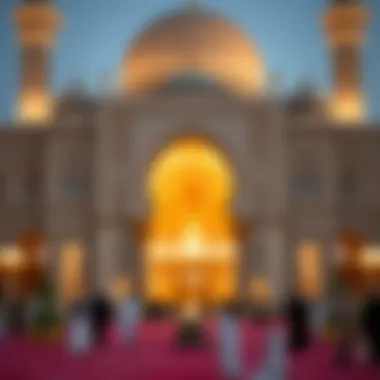
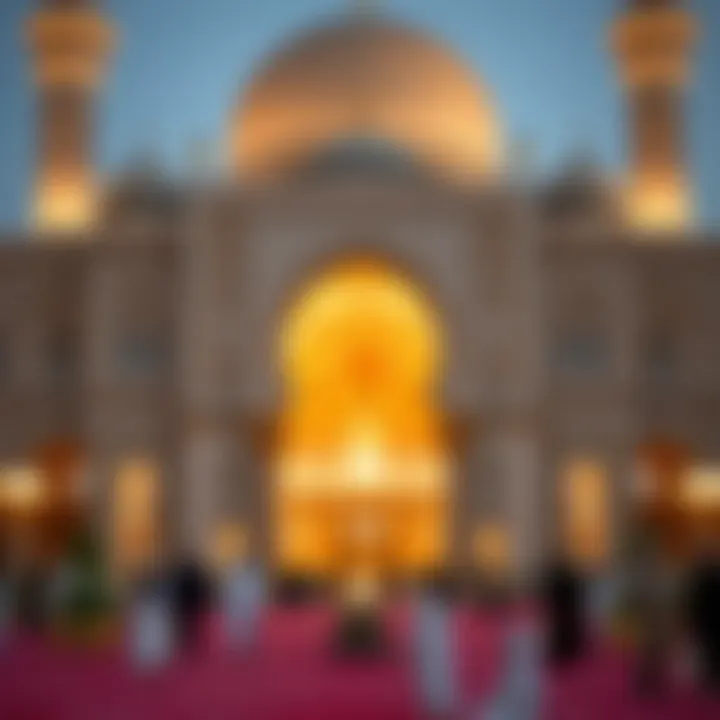
Intro
Ramadan holds a significant place in the fabric of the United Arab Emirates. It is more than just a month of fasting; it embodies a time of spiritual reflection, community gathering, and cultural exchanges. During this sacred month, the UAE becomes a mosaic of religious fervor and social interactions that transcend its diverse population's backgrounds.
The importance of Ramadan in the UAE goes beyond personal spiritual discipline. It mirrors the broader ethos of the nation, which honors tradition while fostering inclusivity among various cultures. As the sun sets and the call to prayer reverberates through the skies, a palpable sense of unity is felt across the emirates. Whether through community iftars or elaborate decorations that spring up across the cities, Ramadan shapes societal behavior and cultural practices in profound ways.
In this exploration, we will delve into the multifaceted nature of Ramadan in the UAE, examining its spiritual significance and the cultural practices that define it. We will also uncover how this month influences daily life, social interactions, and even the real estate landscape, showcasing the unique ways in which the observance of Ramadan interlaces with modernity and tradition.
As we navigate through various aspects of Ramadan, we will observe not only the customs and traditions but also the ways in which these practices impact everything from culinary experiences to the dynamics of the property market during this sacred time.
The Essence of Ramadan
Ramadan, a month revered by millions, encapsulates a variety of spiritual and cultural significances that resonate deeply across the United Arab Emirates. It's a time that goes beyond mere fasting; it represents a period for reflection, devotion, and community engagement.
Understanding the essence of Ramadan involves recognizing its multifaceted nature. It is a month when individuals step back from their fast-paced lives, capturing the spirit of patience and gratitude. The rigorous practices are not solely about abstaining from food or drink; instead, they foster unity among family and the community. Attention is directed toward spiritual growth and personal discipline.
Ramadan also serves as a reminder of empathy. Fasting from dawn to dusk fosters an understanding of hunger and poverty, encouraging those who can to support charitable missions that return societal favors. This need to give back strengthens community bonds and amplifies the spirit of camaraderie.
Understanding Ramadan
The foundation of Ramadan lies in its deeply spiritual roots. For Muslims, it’s a time dictated by the lunar calendar and signifies a journey of inner reflection and reset. Many start this month by setting personal intentions, focusing on areas such as faith, family, and self-care.
Traditionally, the month is marked by fasting during daylight hours, but it is equally characterized by nighttime prayers and a series of social gatherings. Different families may have their own distinct practices; some prefer quiet, serene evenings while others thrive on large communal dinners during Iftar, which opens the fast each evening. In the UAE, this cultural tapestry is interwoven with the various traditions brought in by its diverse population, making Ramadan a potpourri of rich experiences.
Spiritual Importance
Spiritually, Ramadan stands tall as a period meant for cultivating a connection with the divine. Days are spent tending to personal actions, minimizing distractions, and refocusing on prayer and contemplation. Many individuals delve into the reading of the Quran, aiming for a deeper comprehension of their faith while igniting a fire for continuous learning.
"Ramadan is not just about abstaining from food; it seeks to awaken a consciousness that ties every individual back to their innate goodness.”
Fasting serves a dual purpose; not only does it purify the body, but it also cleanses the soul. This month fosters a sense of humility and gratitude, pointing towards the greater good and instilling values of compassion and charity. Through conscious efforts of self-improvement, individuals not only grow closer to Allah but also integrate those values into their daily lives post-Ramadan. Even the practices of generosity and community support spill over into everyday interactions, underlining the profound impact of this holy month.
The Essence of Ramadan embodies both a collective and individual journey. It invites Muslims and non-Muslims alike to bask in the warmth of understanding and collaboration, ultimately fostering a sense of shared humanity.
Historical Context of Ramadan in the UAE
Understanding the historical context of Ramadan in the UAE provides a richly layered perspective on how the holy month has been integrated within the fabric of Emirati life. As with many traditions rooted in substantial histories, Ramadan carries a narrative that reflects the spiritual depth and cultural amalgamation that characterizes this period. This segment endeavors to unravel how historical traditions and the influence of Bedouin culture have shaped the observance of Ramadan today.
Traditions Through Time
Deep within the sands of the UAE, the traditions of Ramadan have evolved over centuries. Evidence suggests that the observance of fasting during Ramadan has origins that trace back through the time before the establishment of the UAE as a modern state. Historically, fasting has always been a means for individuals to purify themselves, showing restraint and compassion for the less fortunate.
In a time when the desert was a relentless landscape marked by scarcity, the act of sharing meals during Iftar became a communal affair, emphasizing unity rather than isolation. Families and neighbors would gather to break their fast together, fostering bonds that transcended social boundaries. This practice was not just about consuming food but also about cultivating relationships and reinforcing social cohesion.
Furthermore, the rich history of trade in the Arabian Peninsula, particularly by sea routes, brought diverse cultural influences into the UAE. The integration of different customs, spices, and traditions from traders lent a unique flavor to Iftar meals. Over time, an array of dishes emerged that blended local flavors with those borrowed from other cultures, enriching the culinary experiences associated with Ramadan. For example, dishes like harees and fattoush have become staples during the holy month, reflecting a synthesis of cultural identities.
Influence of Bedouin Culture
The Bedouin culture, with its distinct traditions and ways of life, has notably impacted Ramadan practices in the UAE. Historically, the Bedouins relied heavily on their environment, emphasizing values like hospitality and generosity. Their way of life was imbued with a sense of community and solidarity, elements that manifest prominently during Ramadan.
To this day, the spirit of majlis, a traditional gathering space, plays a crucial role during Ramadan. Bedouins would welcome travelers and neighbors, sharing their Iftar meals. This hospitality is a reflection of the age-old values that are still honored today. Meals during Ramadan often involve large gatherings where the breaking of fast extends beyond just family to include friends and community members, promoting a collective environment.
Additionally, the Bedouin's deep connection to the land and the significance placed on shared resources can be seen in charitable acts like giving Zakat, a form of almsgiving that holds substantial weight during Ramadan. The empathy and sense of responsibility towards others are amplified, demonstrating how deeply rooted cultural narratives shape contemporary practices.
Cultural Practices During Ramadan
Ramadan in the UAE is more than a month of fasting; it is a vivid tapestry woven from cultural practices that highlight the essence of this sacred period. These practices not only emphasize the spiritual importance of Ramadan but also foster community spirit and solidarity among its diverse population. In a region known for its multiculturalism, the ways in which the UAE's residents observe Ramadan reflect a blend of traditions, making it a profound experience both spiritually and socially.
Fasting Rituals
Fasting is the cornerstone of Ramadan, serving as a direct link between the physical and spiritual realms. In the UAE, individuals abstain from food, drink, smoking, and even complaints from dawn until sunset. This is not merely an act of deprivation; instead, it is a time for contemplation, self-discipline, and empathy towards those less fortunate.
Some fast for health reasons too, as fasting can be seen as a means to detoxify the body and mind.
Interestingly, the UAE has developed a unique approach to fasting. For example, even those who are not Muslim often participate in the fast as a way of showing respect and solidarity with their Muslim friends and colleagues. This inter-cultural practice fosters understanding and respect across communities, further unifying the nation during this holy month.
Additionally, many organizations adopt flexible work hours to accommodate fasting individuals, recognizing the need for altered productivity rhythms during this time.
Iftar Traditions
Iftar, the meal that breaks the fast, is both a spiritual and social occasion. It often begins with the eating of dates and drinking of water, following the tradition of the Prophet Muhammad. In UAE, the flavors during Iftar reflect the country’s rich culinary heritage. Traditional dishes include harees, a wheat and meat porridge, and mjadarra, a lentil and rice dish, both brimming with flavor and nutrients that provide energy after a long day of fasting.
Many families gather for Iftar to share this meal, reinforcing kinship bonds. Public spaces often host community Iftars, where residents come together to feast and celebrate their shared faith and culture.
"Iftar is a time when families strengthen their ties and neighbors become friends," says Fatima, a long-time resident of Abu Dhabi. "It’s heartwarming to see how everyone comes together, regardless of their backgrounds."
Moreover, some restaurants offer special Iftar buffets, allowing guests to indulge in a variety of local and global cuisines. The ambiance is often vibrant, filled with joy and a sense of communal celebration.
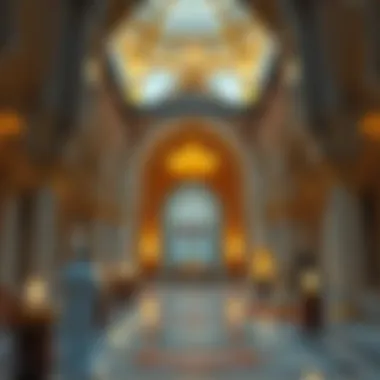

Suhoor: The Pre-Dawn Meal
Suhoor is the pre-dawn meal consumed before the fasting day begins. Unlike Iftar, Suhoor tends to be a quieter affair, often enjoyed with family in the early hours of the morning. It is an essential meal that prepares the body for the day ahead, encouraging fasts to remain healthy and manageable.
UAE residents often choose hearty foods for this meal. Common options include foul, a dish made from fava beans, served with olive oil and spices; flatbreads alongside yogurt, and fresh fruits to provide hydration.
In recent years, cafes have started offering special Suhoor menus, turning this morning ritual into a delightful dining experience, combining tradition with contemporary dining trends.
Maintaining sufficient hydration and nourishment during Suhoor is critical. People commonly advise drinking plenty of water, as dehydration can be a real challenge when fasting in the warm desert climate of the UAE. With that in mind, it’s not just about the food, but also about ensuring that one prepares both body and mind for a day of reflection and spiritual growth.
In essence, the cultural practices surrounding Ramadan in the UAE offer a rich blend of traditions that enhance the sacred experience of fasting, communal sharing, and spiritual reflections, all while showcasing the nation's diverse cultural roots. These rituals nourish the body and soul, maintaining a sense of unity among residents.
Community Engagement and Charity
The spirit of Ramadan transcends mere fasting; it embodies a profound sense of community engagement and charity. In the UAE, where diverse cultures intertwine, Ramadan becomes a time for people to come together and support one another, creating a vibrant ecosystem of giving and togetherness. The communal aspects are essential, as they reinforce the values of compassion and social responsibility inherent in the teachings of Islam.
During this holy month, individuals are prompted not only to focus on their spiritual practices but also on how their actions can benefit the wider community. Engaging in charitable actions fosters unity and shared purpose, allowing various nationalities and cultures to connect on a deeper level. Moreover, acts of charity extend beyond simple monetary donations; they encompass time, effort, and resources dedicated to uplifting those less fortunate.
"Charity does not decrease wealth, It increases it."
— Prophet Muhammad
Zakat and Its Role
Zakat, an obligatory form of charity for Muslims, holds a pivotal position in the community fabric during Ramadan. It is calculated as a specific percentage of one’s savings and is typically given to the needy. The significance of Zakat lies in its ability to redistribute wealth within the community, thereby alleviating poverty and famine. In the UAE, there is a remarkable emphasis on fulfilling this religious duty during Ramandan. The funds raised through Zakat not only help those in immediate need but also provide long-term support for various social welfare initiatives.
A noteworthy trend in the UAE is the establishment of numerous organizations that ensure the Zakat collected is effectively channeled to those who require assistance. This structured approach enhances transparency and trust, encouraging more individuals to participate in charitable giving. People see the fruits of their contributions directly benefiting children's education, healthcare, and numerous social programs.
Community Iftars
Community Iftars are another hallmark of Ramadan in the UAE. These communal gatherings, often organized in mosques, public places, or community centers, embody the true essence of sharing and togetherness. During these events, individuals and families break their fast with carefully prepared meals alongside friends and strangers alike. These gatherings create an atmosphere of warmth, promoting understanding among people from different backgrounds.
Iftar events often feature traditional emirati dishes like thareed and harees, symbolizing the rich culinary heritage of the UAE. The collective breaking of the fast strengthens bonds among participants while fostering a spirit of generosity and kindness.
Community Iftars also serve as platforms for various organizations to promote causes and mobilize support for social initiatives. They can be viewed as micro-communities, encouraging attendees to engage further in charitable acts and community service, thereby expanding the reach of their positive impact.
Ramadan's Influence on Daily Life
The month of Ramadan brings about significant changes in the daily lives of people living in the UAE, intertwining work, shopping, and personal time into a rich tapestry of experiences. As communities embrace the rituals of fasting and reflection, several key adjustments surface, deeply influencing how residents engage with their routines and surroundings. This examination delves into how these adaptations create a unique environment during the holy month, bringing both challenges and rich opportunities.
Adjustments to Work Schedules
One of the most noticeable effects of Ramadan is the modification of work schedules across the UAE. Businesses often shorten their working hours, accommodating employees observing the fast. For instance, in many organizations, the typical workday may shift to a mere six hours, sometimes starting at 9 AM and concluding by 3 PM. This alteration is rooted in the understanding that fasting can affect energy levels and productivity. In practical terms, this means:
- High-Energy Hours: Mornings tend to see heightened productivity, as many people are still energized before midday. This offers a chance for important meetings or project work to take place early in the day.
- Flexibility: Certain companies allow for remote work or flexible hours, catering not only to their Muslim workforce but also creating a more accommodating work environment for all, given the collective change in energy and focus.
- Community Vibe: The shift in working hours results in a unique social dynamic as colleagues enjoy Iftar together, fostering team spirit and enhancing relationships after a long day of fasting.
"With the sun setting, the day gives way to an atmosphere of unity, as colleagues gather for Iftar, breaking bread and sharing stories of their day."
Adjusting schedules isn’t just about easing workloads; it’s about promoting thoughtful engagement with Islamic practices while also respecting the personal space of non-fasting colleagues. This balance is crucial in a multicultural landscape like the UAE, where diverse backgrounds intermingle.
Shopping Patterns
Shopping habits also undergo a transformation during Ramadan, driven by changing consumer behaviors and societal norms. With a focus on family and community, late-night shopping becomes a staple, punctuated by lush markets filled with colorful lights and festive decorations.
- Peak Hours: Retailers often observe a significant surge in activity post-Iftar. Shops stay open longer, attracting families and friends who gather for shopping as an enjoyable evening outing. This spike in footfall illustrates how shopping shifts from a mundane chore to an exciting event.
- Grocery Trends: There’s a noticeable change in grocery purchases. Foods aimed at Iftar meals, such as dates, fruits, and traditional dishes, fly off the shelves. Also, supermarkets start displaying Ramadan-specific items prominently, catering to the religious practices of their consumers.
- Sales and Promotions: Many retailers capitalize on this festive spirit, launching special promotions, discounts, and curated Ramadan packs, enticing customers to splurge and celebrate the occasion with sumptuous meals and gatherings.
In embracing these shifts, businesses not only respect the spirit of Ramadan but also enhance their economic opportunities. The collective influence on daily life becomes obvious, as community engagement through shopping fosters deeper social connections throughout the holy month.
Culinary Highlights of Ramadan
Culinary customs during Ramadan in the UAE hold immense importance that goes beyond mere sustenance. Food becomes a symbol of hospitality, social interaction, and faith. The month isn't just about fasting; it’s a rich tapestry interwoven with flavors, community gatherings, and cherished traditions. Emphasizing the culinary highlights serves to underscore how meals foster belonging and spiritual reflection during this sacred time.
Traditional Foods and Dishes
When one thinks of Ramadan meals, a plethora of traditional dishes comes to mind. These foods often carry stories and memories, linking generations through flavors.
- Dates: The quintessential food for breaking the fast. Often served with milk or water, they offer a quick energy boost after a long day of abstaining from food. Many families have specific types of dates they prefer, such as Medjool or Ajwa, which are considered particularly special and are frequently gifted.
- Luqaimat: These sweet dumplings, drizzled with syrup, are a staple in many households. Crispy on the outside and fluffy inside, luqaimat brings joy and a sense of celebration to Iftar.
- Samboosas (Samosas): These savory pastries can be stuffed with lentils, vegetables, or meat. Their delightful crunch and bursting flavors make them a favorite during evening meals. Preparing samboosas can often be a communal activity, fostering togetherness.
- Mandi: A traditional dish made with rice, meat, and a blend of spices, Mandi is typically served on special occasions. Its aromatic qualities and communal serving style embody the spirit of sharing.
As families gather around the dining table for Iftar, aromatic dishes create an atmosphere of warmth and unity. Each bite tells a story, reinforcing cultural ties and ensuring that memories are made with every meal.
Popular Iftar Spots in Dubai
In the culinary landscape of Dubai, several spots stand out for their unique offerings during Ramadan. These establishments not only provide exceptional food but also serve as social hubs for families and friends.
- Al Fanar Restaurant: Renowned for its authentic Emirati cuisine, this spot offers a traditional Iftar that includes all the classics. The ambiance is designed to reflect the heritage of the Emirati experience, making it a favorite among locals and visitors alike.
- The Arabian Tea House: This charming location in Al Fahidi offers a cozy setting for Iftar, complete with a vast array of dishes, from traditional stews to delightful desserts. The laid-back atmosphere encourages guests to unwind and share stories.
- At.mosphere: Positioned in the Burj Khalifa, the dining experience here is not just about food; it’s about the view. Their Iftar spread includes an international buffet, catering to a diverse clientele while still incorporating local flavors.
- Zayed Road’s Iftar Tent: This tent is famous for its lively atmosphere during Ramadan, offering a range of food stalls with traditional and modern delights. It's a lively social gathering spot for many families.
Each venue boasts its unique charm, whether it’s elegant dining experiences or casual gatherings. The rush to enjoy Iftar outside often transforms these locations into bustling centers of community life during Ramadan.
"Food is not just about what is on the table, it’s about who is around it, highlighting the communal essence of Iftar during Ramadan in the UAE.”
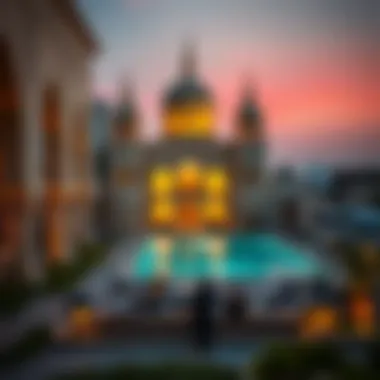

In sum, the culinary highlights during Ramadan not only nourish the body but also the soul, knitting together the threads of culture, history, and community in the UAE, making this month truly special.
The Real Estate Landscape During Ramadan
During Ramadan, the real estate market in the UAE experiences unique shifts and trends. This month not only brings spiritual reflection but also influences various sectors of the economy, particularly real estate. Understanding these dynamics is crucial for investors, homeowners, agents, and analysts alike. The market’s behavior during this period reveals insights into broader economic patterns and community priorities in the context of cultural observances.
Impact on Property Demand
The demand for properties during Ramadan often sees a notable fluctuation. Many families seek to relocate or upgrade their living spaces before the holy month begins, aiming for a home that better accommodates gatherings for Iftar or Suhoor.
Some key points to consider regarding property demand include:
- Increased Rental Activity: As many expatriates look for temporary housing, rental properties tend to experience a surge in demand. Short-term leases might become more attractive during Ramadan, especially those that cater to families looking for a festive environment.
- Home Sales Fluctuations: Interested buyers might delay critical purchasing decisions due to the fasting period, as this is often a time for introspection rather than financial transactions. However, towards the end of Ramadan, as Eid approaches, there may be a spike in interest among serious buyers eager to finalize deals before the holiday.
- Focus on Family-Oriented Properties: Locations with larger spaces to host family and friends often become more sought after. Homebuyers are more inclined to invest in properties that provide room for communal activities around this time, impacting marketing strategies and property listings.
"Ramadan reshapes the dialogue in the real estate sector, turning casual interest into active pursuits as families prepare for communal celebrations and family gatherings."
Trends in Hospitality Properties
The hospitality industry presents a fascinating case during Ramadan. Hotels and accommodations often adjust their offerings to align with cultural practices and the needs of guests.
- Tailored Ramadan Packages: Many hotels create special Ramadan packages. These often include Iftar and Suhoor meals, cultural events, and even discounted rates. Creating these offers not only attracts domestic visitors but also international tourists wanting a unique cultural experience.
- Increased Business Travel: While leisure travel might wane, business-related stays can spike. Companies hosting iftars often require accommodating space for employees and clients, which can drive demand for hospitality properties.
- Focus on Community Engagement: Hotels often become centers for community engagement, hosting events and charity drives. This trend can enhance a hotel’s brand image and community relations, making them focal points during the Ramadan season.
Understanding these trends can provide valuable insights for stakeholders in the real estate market. By paying attention to the evolving landscape during Ramadan, investors and property managers can leverage opportunities that arise within this unique context.
Ramadan Events and Festivals
During the holy month of Ramadan, the United Arab Emirates comes alive with a tapestry of events and festivals that highlight the cultural significance of this sacred time. These gatherings offer a unique platform for community bonding, spiritual growth, and celebration of traditions that have been cherished for centuries. The events not only reflect the Islamic spirit of Ramadan but also showcase the UAE’s rich cultural diversity, drawing on elements from various communities residing within the country.
Festivals during Ramadan are structured to foster familial and social ties, allowing people to come together in shared experiences. They serve as a reminder of the importance of giving back, reflecting on one’s faith, and engaging in communal responsibilities. The vibrance of these events often captivates both residents and visitors, offering a glimpse into the heart of Emirati culture.
Cultural Festivals
Cultural festivals during Ramadan often feature a variety of activities, from traditional music and dance performances to showcases of culinary arts. In cities like Dubai and Abu Dhabi, you will encounter bustling markets known as Ramadan Souks, where vendors proudly display local crafts, clothing, and delicious delicacies. The aroma of spices and the visual feast of authentic dishes tantalize the senses, inviting people to explore and engage with the local heritage.
Moreover, many venues host open-air iftars, allowing community members to break their fast together. These gatherings promote social interactions among diverse populations while educating attendees about Islamic customs, fostering a spirit of tolerance and understanding. Here, one might find an array of flavors, from saffron-infused dishes to sweet pastries, making the culinary experience during Ramadan truly unforgettable.
Some cultural festivals also incorporate storytelling sessions that recount historical narratives and Islamic teachings, reminding participants of the spiritual essence of Ramadan. This collective storytelling not only entertains but also imparts lessons and values intrinsic to the community.
"Cultural events during Ramadan provide not just entertainment, but are also a vital link connecting generations and cultures together."
Art Exhibitions and Performances
Art exhibitions during Ramadan take on an especially powerful role, as they often explore themes of faith, community, and resilience. Artists from diverse backgrounds gather to showcase works that resonate with the spirit of the month. From photography capturing the essence of communal life to paintings that depict historical Islamic architecture, these exhibitions encourage deeper contemplation on how art can bridge cultural divides.
Furthermore, theaters and performance spaces exhibit plays and musical performances that reflect traditional Arabic storytelling combined with contemporary narratives. These events invite audiences to engage with the richness of the Arabic language, as poets and performers enchant with verses steeped in meaning and beauty. Such performances also contribute significantly to cultural preservation, displaying the importance of artistic expression in understanding one’s heritage.
In all, the diverse array of events and festivals during Ramadan in the UAE plays a vital role in enriching the community. They act as a reminder of the month’s spiritual significance while allowing for a celebration of the rich cultural fabric of the nation. For anyone navigating this vibrant period, engaging in these cultural offerings is not just a celebration, it’s an immersion into a truly unique experience.
For more insights into cultural practices during Ramadan, check these resources:
- Wikipedia - Ramadan
- Britannica - Ramadan
- Reddit - Ramadan Discussions
- UAE Government - Ramadan Initiatives
- Facebook Community - Ramadan Events
Explore these events and be part of a rich cultural tapestry that reflects the essence of unity and community.
Challenges Faced During Ramadan
During Ramadan, the challenges that arise can be quite layered and complex, particularly in the United Arab Emirates where the blend of tradition and modernity shapes daily life. As individuals and communities navigate their spiritual obligations, they also contend with various health and societal pressures.
Potential Health Issues
Fasting from dawn until dusk can lead to a range of potential health concerns. Many who observe Ramadan may experience dehydration, headaches, or fatigue due to the significant alterations in their eating and drinking patterns.
"The key to thriving during Ramadan lies in balance, and health should never take a backseat."
Common issues include:
- Dehydration: Without fluid intake throughout the day, individuals can find themselves dehydrated. This can exacerbate pre-existing health conditions and impair physical performance.
- Nutritional Deficiencies: While it’s an opportunity for spiritual reflection, failing to plan meals can result in lacking essential nutrients. Meals like iftar and suhoor often focus on filling, yet not always nutritious foods, potentially leading to an imbalance.
- Digestive Problems: For many, breaking the fast is done eagerly and can lead to overeating or indigestion. Many may not realize that it’s important to pace oneself when consuming food after hours of fasting.
Balancing Work and Faith
Adapting to the demands of Ramadan while maintaining professional responsibilities is another balancing act faced by many Ramadan observers. In the UAE, where economic life is vibrant, the challenge intensifies. The workday typically shifts to accommodate fasting hours, but this adjustment does not come without its hurdles.
- Altered Schedules: Work hours during Ramadan may be shorter, but there’s a consistent need to deliver results. This can create a situation where exhaustion sets in, leading to decreased productivity.
- Social Expectations: Community engagements are plentiful during Ramadan. Professionals often find it tough to manage workloads while engaging in cultural and spiritual activities related to the month.
- Mental Load: The added stress of balancing spiritual duties, such as extra prayers and charitable acts, with professional responsibilities can weigh down on individuals, affecting their focus and overall efficacy at work.
In summary, while Ramadan is a time of spiritual rejuvenation, the challenges can be significant. From health issues stemming from fasting to the complexities of managing work-life balance, it is crucial for individuals to navigate these challenges thoughtfully.
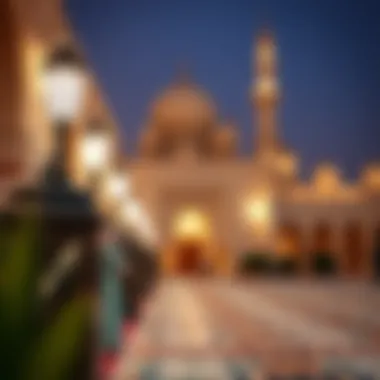
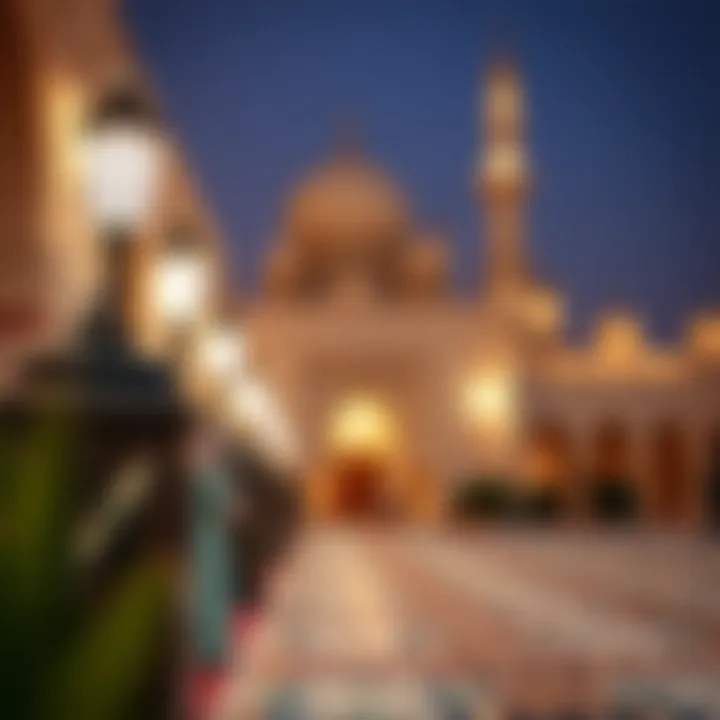
Ramadan and the Role of Technology
The integration of technology in Ramadan practices is both fascinating and crucial, reflecting a shift in how individuals engage with their spirituality during this holy month. In today’s digital age, technology is not just a convenience; it becomes a crucial facilitator for rituals, community connection, and personal growth. As the UAE embraces modernity while upholding traditions, technology plays a leading role in enhancing the Ramadan experience.
Apps for Fasting and Prayer
The digital landscape is dotted with an array of applications specifically designed to cater to the needs of Muslims observing Ramadan. These tools are more than mere extras; they serve as lifelines for many during an otherwise challenging month. Some notable apps provide features such as:
- Prayer Timings: Accurate schedules for the five daily prayers are essential during Ramadan. Apps like Muslim Pro and Athan ensure that users never miss a prayer, even if their routine shifts.
- Quran Recitation and Tafsir: The ease of accessing the Quran via apps can transform a casual reading habit into a structured routine. Many users turn to platforms like Quran Majeed for recitations, translations, and tafsir (interpretation), making it simpler to engage with the holy text daily.
- Fasting and Meal Planning: Apps like MyFitnessPal can help users track their food intake during Iftar and Suhoor. Meal planning aids in ensuring that families nourish themselves adequately throughout the day.
The significance of these applications cannot be overstated. They offer customization and adaptability tailored to individual lifestyles. The convenience of having these resources at one's fingertips fosters a deeper connection to the spiritual practices of Ramadan while simultaneously managing day-to-day activities.
Online Communities and Support
Digital platforms play a significant role in forging connections during Ramadan, enabling communities to come together despite physical distances. Social media, chat groups, and other online forums have become a vital aspect of communal support and sharing.
Engagement within these communities often includes:
- Sharing Iftar Recipes: Platforms like Facebook and Instagram witness an influx of posts showcasing unique iftar dishes. This not only inspires creativity but also nurtures a sense of belonging as people share their family's traditional recipes.
- Virtual Iftars and Gatherings: With geographical constraints, individuals are finding ways to connect through virtual Iftar events, bringing families and friends together via video conferencing platforms. These gatherings allow for the communal spirit of the month to flourish, albeit in a digital space.
- Charitable Initiatives: Online fundraising for charities often sees a spike during Ramadan, with many Muslims utilizing social media to promote causes aligned with their values. Platforms such as GoFundMe or JustGiving allow effortless sharing of charitable drives that take place during this significant period.
In shaping the Ramadan experience, online communities provide emotional support, disseminate information about events, and promote charitable causes, creating a robust network that enriches the observance of this sacred month.
As the world continues to navigate technological advancements, the role of technology in Ramadan becomes increasingly vital. These tools not only support spiritual adherence and community connection but also pave the way for a modern interpretation of a timeless tradition. By fostering deeper engagement with faith, technology enhances the overall experience of Ramadan in the UAE.
Reflections on Ramadan Experiences
Ramadan holds a special place in the hearts of individuals across the UAE, serving as a period of profound self-reflection and spiritual growth. The depth of the experiences people encounter during this holy month branches out to touch every aspect of life. It's not just about fasting and prayer; it's about reflecting on one's life, one's actions, and one's faith. This section delves into the significance of these reflections, offering insight into how they influence both personal and community dynamics.
Personal Stories
In the tapestry of Ramadan, personal stories weave the most vivid threads. Each narrative brings unique experiences—some people find spiritual awakening, while others have quite the opposite journey. Take, for instance, Aisha, a teacher in Abu Dhabi, who discovered that Ramadan was not just a time for abstaining from food, but also a time for re-evaluating relationships with family.
Her Insight: "I used to think it was all about the meals and the prayers. But during Ramadan last year, I found myself having deep conversations with my kids, something I hadn’t done in years."
Such transformations often shift perspectives, shaping more than just individual lives. Another individual, Samir, discussed his journey towards forgiveness during the month.
“I realized how much resentment I held towards past events in my life. Ramadan helped me to let go and move forward.”
Throughout the month, individuals share their stories, which range from heartfelt confessions to joyous moments of unity. Many find that talking openly about their experiences fosters a sense of belonging, especially in multicultural settings like Dubai, where expats from numerous backgrounds gather to share meals and devotion.
Community Impacts
On a larger scale, Ramadan shapes community interactions in remarkable ways. Community-driven events form the backbone of this month, highlighting collective spirit through initiatives like meal distributions or group prayers.
In cities like Sharjah, neighborhoods come alive with various communal iftars. These meals aren't just about food; they're about building bridges. They facilitate interactions between locals and expatriates, inviting understanding and respect among different cultures.
Here are some common characteristics of communal activities during Ramadan:
- Cultural Exchange: Attending community iftars allows for sharing culinary traditions among different cultures, creating a rich melting pot of flavors and experiences.
- Unity in Diversity: Regardless of the background, Muslims and non-Muslims join hands to foster mutual growth, creating an environment of acceptance and understanding.
- Charitable Acts: Many communities rally together to provide food and resources for those less fortunate, emphasizing the essence of giving back that Ramadan brings forth.
In addition to fostering community ties, these collective reflections also promote a greater awareness of shared struggles, triumphs, and celebrations—strengthening social fabric during and after Ramadan. Such instances develop strong networks of support that often extend beyond the holy month, leaving lasting impacts in the personal lives and overall well-being of the community members.
Reflecting on personal narratives and community impacts shines a light on the transformative nature of Ramadan. Each experience shared sparks a conversation that may just be the catalyst for personal growth or social change. By examining these reflections, we gain a lens into the values, challenges, and aspirations that define the UAE during this significant period.
Ending: The Lasting Impact of Ramadan
As the curtains gradually draw on the month of Ramadan, its profound impact lingers in the hearts and minds of those who observe it. This conclusion encapsulates the essence of the spiritual and cultural repercussions of Ramadan, reflecting its significance beyond just a calendar marker. The practices and beliefs forged during this time resonate throughout the year, influencing various facets of life in the United Arab Emirates.
The importance of Ramadan can be articulated in several key aspects:
- Cultural Cohesion: Ramadan acts as a grand unifier in a nation characterized by diversity. The shared experiences — from fasting, communal prayers, to breaking fast together — forge bonds between individuals from varying backgrounds. It reinforces a collective identity centered around spirituality and mutual respect.
- Spiritual Renewal: For many, this month serves as a time for introspection and spiritual cleansing. The reflective nature of fasting prompts individuals to re-evaluate their lives and reconnect with their faith. The prayers and acts of charity are pathways to a deeper understanding of their beliefs and values.
- Economic Influence: The economic landscape shifts significantly during Ramadan. Businesses adapt to cater to late-night diners and early morning shoppers, showcasing unique products that resonate with the spirit of the month. This adaptability reflects the dynamic nature of the UAE's economy when faced with social and cultural festivities.
Ramadan’s influence is tangible, extending far beyond mere observance; it shapes societal interactions, influences business practices, and fosters a renewed sense of community.
Culinary offerings, community gatherings, and increased charitable activities are all seen as a way to commemorate Ramadan’s spirit and amplify its significance. Merging tradition with modernity, the UAE showcases how even the smallest actions during Ramadan can lead to greater societal impacts.
Legacy of Ramadan in the UAE
The legacy of Ramadan in the UAE is intricately woven into its societal fabric. Centuries of historical observance have given way to evolving practices that reflect both tradition and modernity. These threads encapsulate:
- Generational Wisdom: Elders pass down hunting practices to the younger generations, who embrace or adapt these customs to fit contemporary life while maintaining the core values linked with Ramadan.
- Community Initiatives: Charitable activities, such as providing meals for the needy or community Iftars, serve as enduring practices that exemplify compassion and solidarity. This reinforces a culture of kindness that transcends Ramadan and influences communal relations throughout the year.
- Art and Expression: Ramadan celebrations often bring forth a flourishing of art and creativity. From traditional crafts to contemporary exhibitions focused on Ramadan themes, artists use their medium to express the essence of the month.
In essence, the legacy of Ramadan is one of resilience, community, and spiritual depth. Its practices are embedded in the cultural identity of the UAE, influencing everything from daily interactions to societal norms and values.
Looking Ahead to Future Observances
As each Ramadan unfolds, anticipation builds for the practices and observances that will come to define that year's experience. Looking forward, several trends are emerging that could shape the future of Ramadan in the UAE:
- Technological Integration: With the rising trend of digital tools, apps focused on prayer schedules and community participation are becoming increasingly prevalent. These innovations could lead to a more connected community, offering ways for individuals to engage with Ramadan's essence even when apart.
- Sustainability Movements: As awareness around environmental issues grows, there is a noticeable shift towards sustainable practices during Iftar dinners, where plastic waste is minimized and local produce is prioritized. This aligns well with societal efforts to blend traditional observances with ecological consciousness.
- Cultural Diversification: The UAE's multicultural landscape will likely inspire a richer tapestry of Ramadan traditions, highlighting the ways various cultures interpret fasting and worship. This will further deepen the communal bonds within the country while embracing diverse expressions of the same faith.
As the world keeps changing, so too will the rituals of Ramadan, making each observation unique while grounding it firmly in tradition.















